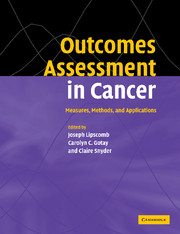Book contents
- Frontmatter
- Contents
- List of contributors
- Acknowledgments
- 1 Introduction to Outcomes Assessment in Cancer
- Health-related quality of life in cancer: general concepts and generic measures
- Assessing health-related quality of life during treatment
- Assessing health-related quality of life across the cancer continuum
- Measuring the experience and needs of cancer patients and caregivers
- 13 Patient advocate perspective on health-related quality of life issues with prostate cancer survivors
- 14 Measuring the patient's perspective on the interpersonal aspects of cancer care
- 15 Needs assessment in cancer
- 16 Assessing the subjective impact of caregiving on informal caregivers of cancer patients
- Methodological considerations in applications to cancer outcomes research
- Modern psychometric theory in cancer outcomes research
- Assessing the economic impact of cancer
- Research and policy implications
- Invited papers
- Index
- References
16 - Assessing the subjective impact of caregiving on informal caregivers of cancer patients
Published online by Cambridge University Press: 18 December 2009
- Frontmatter
- Contents
- List of contributors
- Acknowledgments
- 1 Introduction to Outcomes Assessment in Cancer
- Health-related quality of life in cancer: general concepts and generic measures
- Assessing health-related quality of life during treatment
- Assessing health-related quality of life across the cancer continuum
- Measuring the experience and needs of cancer patients and caregivers
- 13 Patient advocate perspective on health-related quality of life issues with prostate cancer survivors
- 14 Measuring the patient's perspective on the interpersonal aspects of cancer care
- 15 Needs assessment in cancer
- 16 Assessing the subjective impact of caregiving on informal caregivers of cancer patients
- Methodological considerations in applications to cancer outcomes research
- Modern psychometric theory in cancer outcomes research
- Assessing the economic impact of cancer
- Research and policy implications
- Invited papers
- Index
- References
Summary
Introduction
Cancer and its treatment affect not only the patients who have the disease but also their friends and family members who frequently play an important role in providing care. The impact on these “informal” caregivers is multidimensional, affecting many aspects of their everyday activities and emotional well-being. In many cases, caregivers who are also friends or relatives of patients provide emotional support, as well as assist with physical tasks and participate in the delivery of care. As a consequence, these informal caregivers may experience changes in their own social roles, may experience stress, anxiety and/or depression, or have physical effects. However, there are also positive aspects of providing care to a friend or family member, including satisfaction in caring for a loved one and in giving.
The impact on informal caregivers of caring for sick loved ones is of increasing importance as patients with cancer are living longer, policies are pushing care from the inpatient to the outpatient setting, and patients increasingly are preferring to receive care at home. Consequently, there are growing numbers of informal caregivers who are experiencing both the positive and negative impacts of caregiving. As informal caregivers continue to play an important part in the care of patients with cancer, the health care system needs to ensure that the patient is receiving quality care without undue strain on these individuals — strain that could compromise their ability to provide needed care to patients and which could also threaten their own health and well-being.
- Type
- Chapter
- Information
- Outcomes Assessment in CancerMeasures, Methods and Applications, pp. 329 - 345Publisher: Cambridge University PressPrint publication year: 2004
References
- 1
- Cited by



